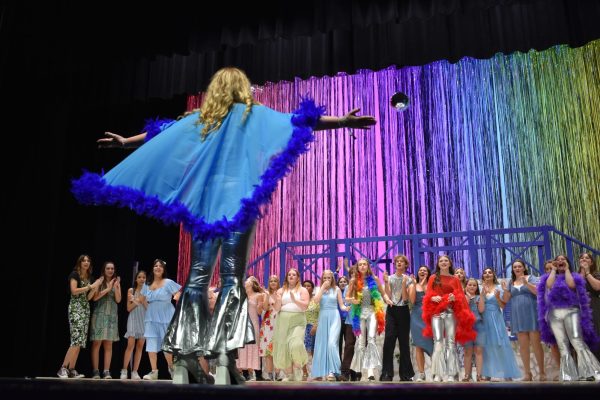
When undertaking a production as massive of a sensation as “Mamma Mia”, a myriad of skills are put to the test. The OHS theater department did more than just prove their abilities and deliver remarkable technical performances. At each showing, people gathered around for the heart and soul of the show.
After months of diligent work, Mamma Mia premiered on October 19th and continued through the 21st. The dazzling sets breathed life into the musical, adorned with sequins and disco balls. Audiences were also charmed by the characters, due to the dedication of each cast member to ensure that all facets of their personalities shined.
“I love the connections Donna had with all of the other characters. The depth of her character was really good… She’s really strong headed, but she still has a lot of love inside of her. She’s not really afraid to speak her mind,” said Grace Wiggins, senior.
Students can be taught how to further cultivate their talents through the diverse identities of the characters they portray.
“It was a drastic change from some of the usual roles I play. The main purpose of Sky’s character is to reflect off of the main character, Sophie. A big part of their relationship is how intimate and in love the characters are. It was kind of a mental game of figuring out how to do that realistically in a scene with somebody that I’m not in a relationship with. But it was good to learn how to do that, and have that experience as an actor,” said Hagen Walsh, senior.
On the surface, the appeal of Mamma Mia is the lighthearted comedy. However, humanity is ingrained underneath as the complexities of various roles are revealed.
“I love performing ‘Lay All Your Love on Me.’ It was always super fun. But I think one of my favorite Sky scenes is in the second act where he ends up fighting with Sophie, mainly because of how angry and hurt he gets. That gave some layers to him that we didn’t see before in the show,” Walsh said.
During planning and rehearsals, a trial and error method can be the most effective. There is a balance that must be found between accurately portraying the character, and including one’s own interpretation.
“She was kind of like me, but not exactly. You try different things, sometimes they work, sometimes they don’t…I wanted to try my hardest to show to the audience those different relationships and bonds… and to appreciate your mom, to appreciate the time you have with people,” said Macey Doyle, junior.
At its core, the premise of Mamma Mia revolves around relationships, and character interactions drive the plot forward. As a result, an immense amount of chemistry is necessary to craft a compelling story. Fortunately, high school students are able to spend time with and get to know the ensemble.
“You’re with the people all the time and you just grow to love all of them. Working with all of them becomes super fun, and you just want to be there with them. You want to be performing your best,” Doyle said.
As members mature and form important friendships, those bonds can be reflected on stage. Consequently, connections between characters appear natural and organic.
“With Macey, we already had that chemistry. I’ve been doing her hair and getting her ready since her freshman year,” Wiggins said.
The essence of each scene manifests beyond dialogue. Choreography can emphasize lyrics and contribute additional energy to the performance.
“You look at those words and what the messages are trying to convey, and you do that in dance… The overall goal is to make sure that it’s something the audience can be sucked into and know the storyline is still happening within the dance number,” Wiggins said.
Furthermore, the world of stage design and tech crew enhances elements out of the actors’ control.
“We had a lot of memories and reminiscing scenes. So during ‘Our Last Summer’ when they would sing, the lights would turn pink for memory and all these flower people would come in. Then all of a sudden they talked and it was gone,” said Devin Clark, junior.
The integration of technology offers its own unique situations. While crew members try to prepare for every faulty microphone and soundboard issue in advance, dealing with them calmly and effectively is of the utmost importance.
“One thing I like to tell them is that I’d rather mess up in rehearsal than at the show. And if we mess up with the show, it still goes on,” Clark said.
Some challenges span every area of the theater department.
“The biggest thing that comes up is time. You always think that you have more time to do all the dances and songs than you actually do,” Doyle said.
Mamma Mia is special because it deviates from the traditional format of a musical. The songs are not written for the production. Instead, it is the other way around.
“Jukebox musicals are really hard to do because you still have to keep the original artists in mind. As a musical you have to think in that 70s ABBA headspace of what they were trying to accomplish, what we are trying to accomplish, and how we can relate them to each other,” Wiggins said.
On opening night, it was evident by the vibrant crowd reaction that the songs are well loved.
“It makes people a lot more attached to the songs. It also makes the show very engaging because most people know the music…then they get put into this musical with the storyline and now it has this whole new life,” Walsh said.
Overall, despite a director change and large-scale project, the show was phenomenal. Every person that played a part in Mamma Mia should be proud; they conveyed all its themes both on and off stage.
“We worked so hard to make this piece one that would go down in OC theater history and that was definitely achieved,” Wiggins said.


